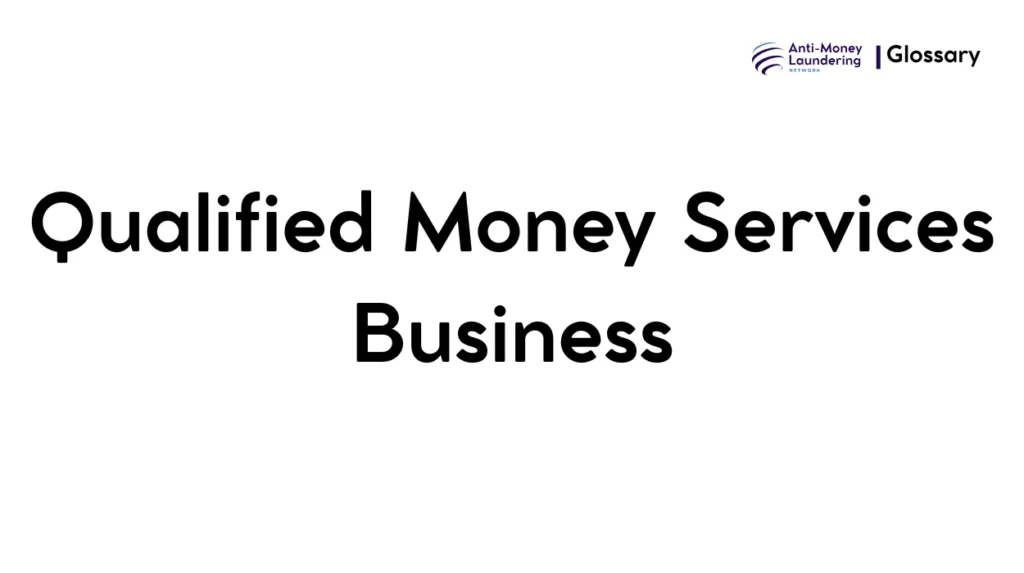Definition
A Qualified Money Services Business (QMSB) is a type of financial institution that engages in transmitting, converting, or exchanging money and meets specific regulatory criteria under Anti-Money Laundering (AML) frameworks. Unlike traditional banks, QMSBs include diverse entities such as money transmitters, currency dealers, check cashers, and certain digital currency platforms. These businesses are subject to AML obligations due to their heightened risk of involvement in money laundering and terrorist financing.
Purpose and Regulatory Basis
QMSBs play a crucial role in the financial ecosystem by facilitating monetary transactions that can be exploited for illicit purposes. Their regulation under AML laws ensures transparency, accountability, and risk mitigation in money flows. Key regulatory frameworks establishing and governing QMSBs include:
- Financial Action Task Force (FATF) Recommendations: Global AML standards that identify MSBs and require countries to enforce AML measures on them.
- USA PATRIOT Act: Defines and requires registration of Money Services Businesses (MSBs) including qualified ones, mandating AML programs.
- European Union’s Anti-Money Laundering Directives (AMLD): Specifies AML obligations for entities engaged in money transmission and currency exchange.
These regulations mandate QMSBs to implement comprehensive AML programs to detect, prevent, and report suspicious activities.
When and How it Applies
QMSB classification applies when a business provides money transmission, currency exchange (including virtual currencies), or payment services surpassing defined transaction thresholds. Common triggers include:
- Receiving or sending funds on behalf of customers.
- Exchanging one currency for another, including digital currencies.
- Issuing or redeeming money orders or traveler’s checks.
For example, a cryptocurrency exchange facilitating regular transfers over $1,000 daily would qualify as a QMSB under U.S. FinCEN rules, triggering AML compliance requirements.
Types or Variants
Qualified Money Services Businesses can be classified into several categories depending on services and regulatory scope:
- Money Transmitters: Entities transmitting funds domestically or internationally.
- Currency Dealers or Exchangers: Businesses converting currencies including cryptocurrencies.
- Check Cashers and Issuers: Firms cashing checks or issuing money orders/travelers’ checks.
- Digital Platforms: Fintech and crypto service providers offering payment or fund transfer services.
Each type has specific AML risks and regulatory nuances requiring tailored compliance efforts.
Procedures and Implementation
To comply with AML obligations, QMSBs must establish and maintain robust systems, including:
- Registration: Registering with relevant authorities like FinCEN within stipulated timelines.
- AML Program Development: Formulating written policies, procedures, and internal controls tailored to their risk profile.
- Customer Due Diligence (CDD) and Know Your Customer (KYC): Verifying client identities and assessing risks.
- Transaction Monitoring: Implementing systems to detect and flag suspicious or large transactions.
- Employee Training: Regular AML training to ensure staff awareness and compliance.
- Suspicious Activity Reporting (SAR): Timely reporting of suspicious transactions to regulators.
- Independent Audit and Review: Periodic assessment of program effectiveness.
These steps ensure QMSBs can adequately manage AML risks.
Impact on Customers/Clients
From the customer’s perspective, QMSB status means:
- Enhanced verification requirements during onboarding (KYC processes).
- Possible restrictions or scrutiny on large or unusual transactions.
- Increased transparency and potential delays due to regulatory checks.
Customers gain added protection against fraud but may encounter more rigorous compliance interactions.
Duration, Review, and Resolution
QMSBs are subject to ongoing AML compliance obligations:
- Registration Renewal: Periodic re-registration (e.g., every two years in the U.S.).
- Program Updates: Continuous review and update of AML policies adapting to emerging risks.
- Record Retention: Maintaining records for prescribed periods (often 5 years).
- Regulatory Inspections: Subject to audits and examinations by authorities.
Non-compliance can lead to revocation of business privileges or penalties.
Reporting and Compliance Duties
Institutional responsibilities include:
- Accurate and timely filing of Suspicious Activity Reports (SARs).
- Maintaining comprehensive records of transactions and customer identification.
- Coordinating with regulators during audits or investigations.
- Implementing corrective actions on compliance deficiencies.
Penalties for failure to comply may include fines, sanctions, or criminal charges.
Related AML Terms
QMSB is linked to AML concepts such as:
- Money Services Business (MSB): The broader category encompassing QMSBs.
- Know Your Customer (KYC): Essential for QMSB customer due diligence.
- Suspicious Activity Reports (SARs): Reporting tool for detecting potential laundering.
- Risk-Based Approach: Tailoring AML controls based on QMSB risk profile.
Understanding these terms helps place QMSB in the wider AML framework.
Challenges and Best Practices
Common challenges faced by QMSBs include:
- Keeping pace with evolving regulations, especially digital currencies.
- Managing complex customer onboarding without harming user experience.
- Monitoring high volumes of transactions effectively.
- Ensuring staff are well-trained and vigilant.
Best practices involve leveraging technology for automated monitoring, risk assessments, and continuous training combined with thorough internal audits.
Recent Developments
Key recent trends affecting QMSBs:
- Expansion of AML requirements to cover cryptocurrencies and virtual assets.
- Increased regulatory scrutiny and fines for non-compliance.
- Adoption of advanced analytics and AI in transaction monitoring.
- Global harmonization of AML standards enhancing cross-border cooperation.
These developments underscore the growing importance of AML vigilance for QMSBs.
Qualified Money Services Businesses are critical players in the global financial system, facilitating essential money transfer and currency exchange services while posing unique AML risks. Compliance with QMSB regulations—rooted in global and national AML laws—is vital to prevent illicit finance activities. Institutions must implement rigorous programs encompassing customer due diligence, transaction monitoring, reporting, and ongoing oversight. For compliance officers and financial institutions, understanding and managing QMSB obligations is fundamental to safeguarding the integrity of financial transactions and meeting regulatory mandates.

